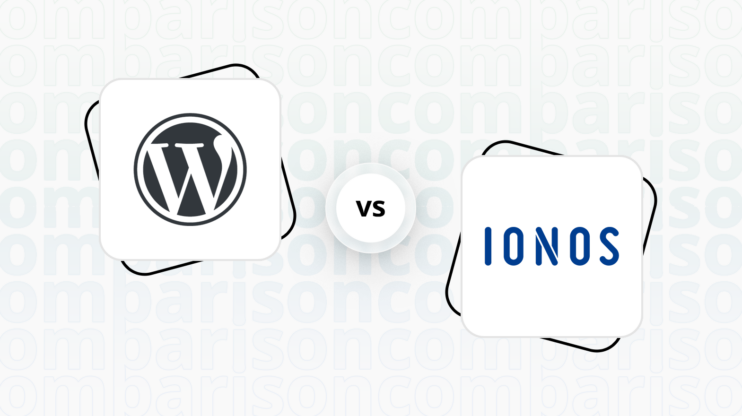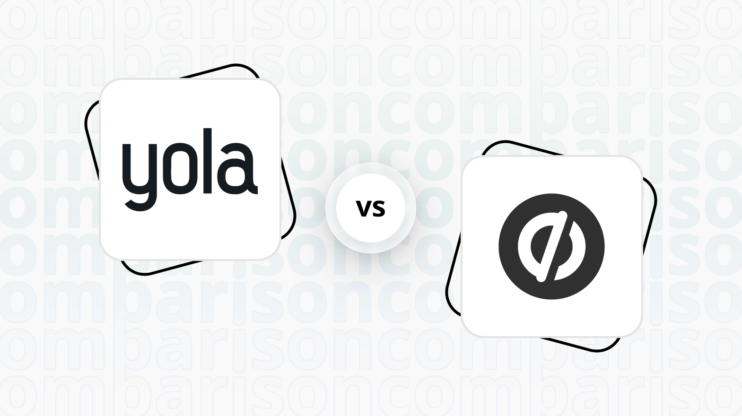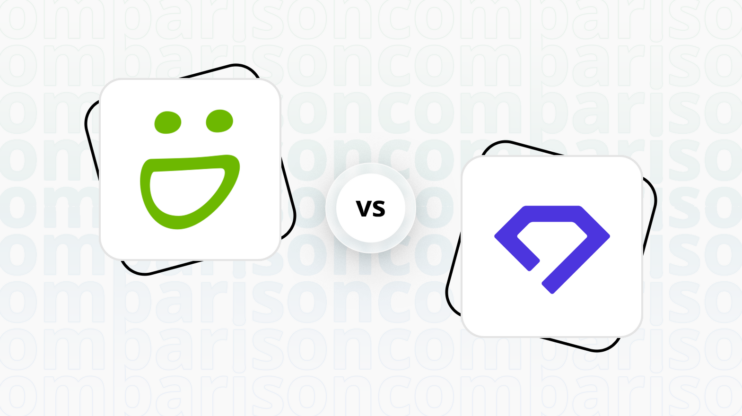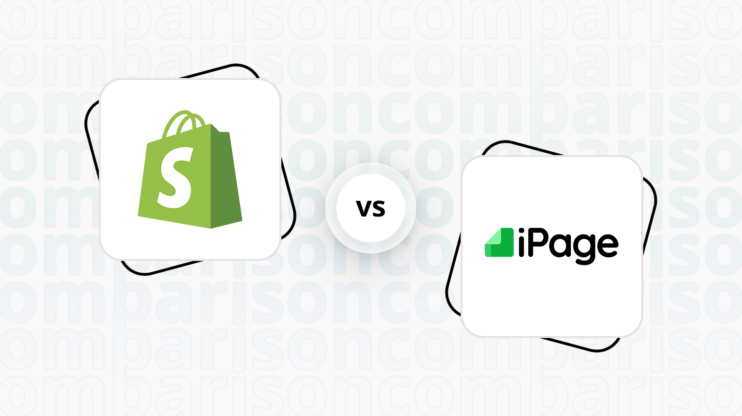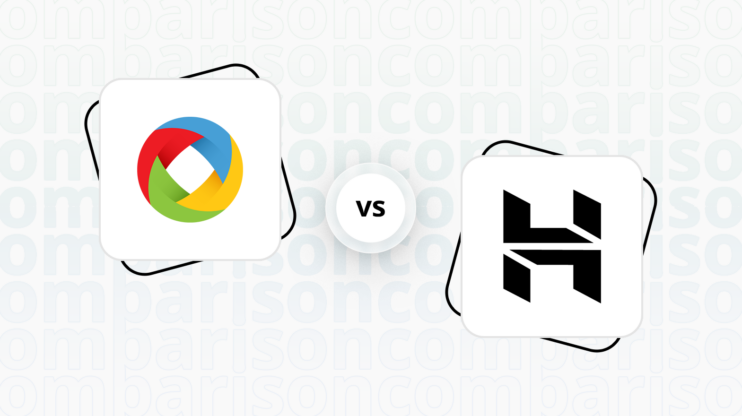WordPress vs Hocoos: Final verdict
WordPress and Hocoos both offer unique advantages, but they cater to different user needs and preferences.
-
WordPress (Overall Grade: 7.1/10)
is a versatile open-source content management system that excels in customization and flexibility. It is ideal for users who need extensive control over their website’s design and functionality. With a vast array of plugins and themes, WordPress is suitable for blogs, business sites, and online stores. However, it may have a steeper learning curve for beginners compared to simpler website builders. -
Hocoos (Overall Grade: 5.6/10)
is a user-friendly AI-driven website builder that simplifies the website creation process. It is perfect for individuals and businesses looking to quickly launch a professional-looking website without coding or technical expertise. Hocoos offers customizable templates, ecommerce integration, and SEO optimization, making it a great choice for users who prioritize ease of use and quick setup.

|

|
|
|---|---|---|
|
Design functionalities & templates |
9.0 |
7.2 |
|
Ease of use |
7.2 |
8.1 |
|
Ecommerce |
8.4 |
7.4 |
|
Website Editors |
8.5 |
7.7 |
|
Product testing options |
8.1 |
7.5 |
|
Price |
5.9 |
7.8 |
|
Hosting quality |
0 |
2.4 |
|
Website speed optimization |
6.5 |
6.2 |
|
Plugins/extensions and integrations |
8.8 |
6.3 |
|
Marketing features |
8.0 |
7.0 |
|
Customer support |
5.0 |
3.0 |
|
Website security |
6.7 |
4.5 |
|
AI capabilities |
6.1 |
7.3 |
|
User Management |
8.8 |
0.0 |
Which one is the best for ecommerce: WordPress or Hocoos?
 8.4
8.4
 7.4
7.4
Verdict
: WordPress is a versatile and powerful option for ecommerce, especially for those who need extensive customization and scalability. Hocoos, while user-friendly and quick to set up, may not offer the same depth of features for larger or more complex online stores.
-
WordPress
: With its WooCommerce plugin, WordPress provides a robust ecommerce solution that includes multiple payment gateway support, abandoned cart recovery, and extensive customization options through themes and plugins. This makes it ideal for businesses looking for a highly customizable and scalable ecommerce platform. However, the setup and management might require more technical knowledge compared to Hocoos. -
Hocoos
: Hocoos offers a more streamlined and user-friendly approach to ecommerce, with built-in features for product and order management, payment processing, and SEO optimization. Its AI-driven website creation process makes it easy to set up a professional-looking online store quickly. However, it may lack the advanced customization and scalability options that WordPress offers, making it more suitable for smaller or less complex ecommerce needs.
Which one is the best for informational and business websites?
 9.2
9.2
 7.4
7.4
Verdict
: WordPress is the superior choice for informational and business websites, offering extensive customization and a vast array of plugins. Hocoos, while user-friendly and AI-driven, falls short in comparison to WordPress’s flexibility and community support.
-
WordPress
: With a score of 9.2, WordPress excels in providing a highly customizable platform suitable for various types of websites, including business and informational sites. Its open-source nature allows for extensive design flexibility and functionality through numerous themes and plugins. The platform is supported by a vast community, offering extensive learning resources and support options, making it a robust choice for those looking to create a comprehensive online presence. -
Hocoos
: Scoring 7.4, Hocoos is a user-friendly AI website builder that simplifies the website creation process. It offers a range of customizable templates and features like ecommerce integration and SEO optimization. However, it lacks the extensive customization options and community support that WordPress provides. Hocoos is ideal for users seeking a quick and easy way to build a professional-looking website without delving into technical details. When comparing WordPress vs Hocoos, Hocoos is more suited for those who prioritize ease of use over advanced customization.
WordPress vs Hocoos: Detailed comparison
Design functionalities & templates
Design FunctionalitiesRepresents how well each platform allows for creative design and customization of websites.Score Components:
- Template Variety (30%): Range and quality of design templates.
- Customization (30%): Flexibility and options for design alterations.
- User Interface (20%): Ease and intuitiveness of the design process.
- Responsiveness (10%): Adaptability to different devices and screen sizes.
- Innovation (10%): Unique design features and tools.
 9.0
9.0
 7.2
7.2
🏆
Winner: WordPress.
If you’re looking for a platform that offers more creative control and a wide array of design features, WordPress is the preferred choice.
WordPress offers an extensive variety of templates and designs, catering to a wide range of website types beyond just blogs or ecommerce. Its open-source nature allows for high customization and creative freedom, appealing to diverse user needs. While WordPress itself doesn’t sell premium templates, numerous third-party theme shops offer sophisticated and specialized design choices, expanding the possibilities for users.
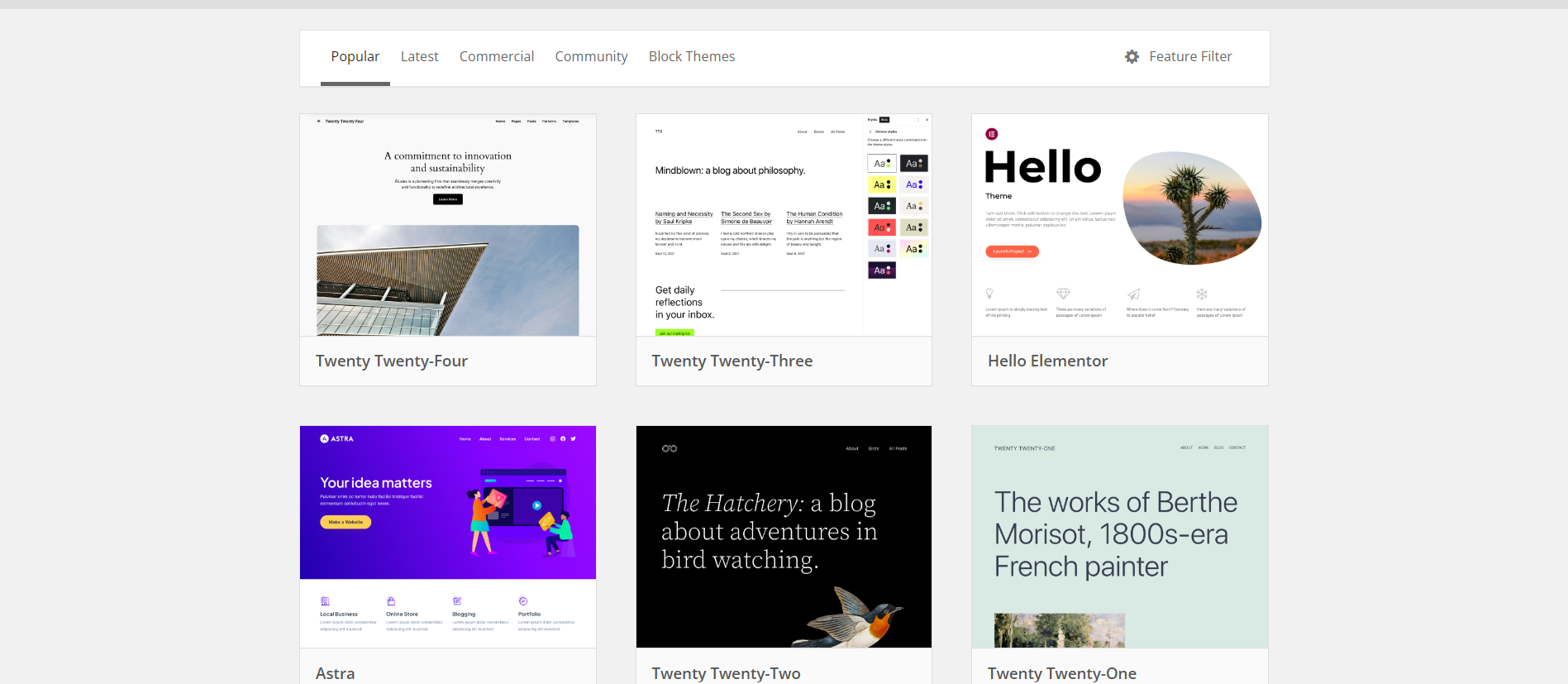

Compared to WordPress, Hocoos offers a wide variety of templates and designs for their website builder. With over 190 professionally designed templates to choose from, users can easily find a design that suits their needs and preferences. The templates are available for various industries and purposes, including business, ecommerce, portfolio, and more. Additionally, Hocoos regularly updates their template library to ensure that users have access to the latest design trends and styles. Whether you’re a beginner or an experienced web designer, Hocoos provides a range of options to create a visually appealing and functional website. However, Hocoos does not provide a link to their themes page or any screenshots of their templates.
Get a head start on website creation with AI
Create a custom website tailored to your business needs 10X faster with 10Web AI Website Builder!
Ease of use
Ease of useReflects the platform’s overall user-friendliness.Score
Components:
- Learning curve (40%): Quickness and ease of getting started.
- Interface design (30%): Simplicity and intuitiveness of layout.
- User guidance (20%): Quality of tutorials and support.
- Flexibility (10%): Adaptability to various user skills.
 7.2
7.2
 8.1
8.1
🏆 Winner: Hocoos
. With a score of 8.1, Hocoos is recognized for its user-friendly interface and AI-driven features, making it easy for users with no coding or design experience to create and customize websites. WordPress, scoring 7.2, offers great flexibility and power, but it can be less intuitive for beginners compared to simpler website builders.
Learning Resources
🏆 Winner: WordPress
. WordPress is supported by a vast array of learning resources, including detailed documentation, community forums, online tutorials, and courses. Hocoos, on the other hand, lacks traditional learning resources, focusing more on simplicity and AI content generation.
For ecommerce
EcommerceMeasures the platform’s effectiveness in supporting online business activities.Score Components:
- Ecommerce themes and templates (20%): Variety and design of templates.
- Product management (25%): Ease of managing and organizing products.
- Payment options (25%): Variety and convenience of payment methods.
- Ecommerce features (20%): Features for managing an ecommerce store.
- Integration (10%): Compatibility with external e-commerce tools and services.
 8.4
8.4
 7.4
7.4
WordPress, with its WooCommerce plugin, offers a robust ecommerce solution with features like multiple payment gateway support, abandoned cart recovery, ecommerce analytics, and SEO optimization tools. Hocoos, on the other hand, provides built-in ecommerce features, including product and order management, payment processing, shipping and logistics, marketing and SEO, analytics and reporting, and customizability and integrations.

|

|
|
|---|---|---|
|
Ecommerce themes and templates |
9.2 |
6.0 |
|
Product page customization |
9.0 |
7.0 |
|
Payment processing and commissions |
7.5 |
6.5 |
|
POS capabilities |
6.5 |
5.5 |
|
Payment gateways |
8.5 |
7.0 |
|
Product numbers |
7.0 |
6.5 |
|
Additional ecommerce features |
8.0 |
7.0 |
WordPress ecommerce features:
- WooCommerce Integration
- Multiple Payment Gateway Support
- Abandoned Cart Recovery
- Ecommerce Analytics
- SEO Optimization Tools
- Extensive Plugin Ecosystem
Hocoos ecommerce features:
- Product management
- Order management
- Payment processing
- Shipping and Logistics
- Marketing and SEO
- Analytics and reporting
- Customizability and Integrations
Ecommerce themes & templates
WordPress offers hundreds to potentially thousands of ecommerce and WooCommerce specific themes and templates, both free and premium. Hocoos, however, does not rely on traditional templates for website creation, including ecommerce sites. Instead, it utilizes AI technology to generate unique and customized websites based on the user’s specific inputs.
Product page customization
WooCommerce on WordPress offers extensive customization for eCommerce product pages, balancing plugins, page builders, and custom coding. Essential elements include quality product images, detailed descriptions, and effective add-to-cart buttons. Advanced features like product tabs, upsells, and related products are customizable. Tools like Elementor and the Ultimate Product Catalog plugin enhance functionality, but heavy plugin use may affect site performance.
Hocoos enables the creation and editing of professional-looking product pages, tailored to enhance the appeal of your products to your target audience, ultimately aiming to boost sales. Additionally, Hocoos allows for easy setup of product variations, including different sizes, colors, or attributes, empowering you to customize offerings, manage pricing, and ensure availability for each variation.
Payment processing
WordPress doesn’t handle payments directly but offers plugin options for payment processing. Popular gateways include PayPal, Stripe, Authorize.Net, and Square. Choose a gateway based on transaction volume, currencies, fees, and security. Plugins integrate gateways with WooCommerce for a user-friendly setup. Consider options for recurring payments, offline payments, and fraud prevention. Research, read reviews, and start small, scaling as needed.
Hocoos simplifies website creation through AI-driven features, offering customizable websites tailored to user preferences. Its platform allows quick website setup by answering a few questions, catering to various business needs such as blogs, online stores, and bookings. Users can personalize their websites using a user-friendly editor for layout, colors, and content. Additionally, Hocoos facilitates online presence with hosting services and integrates payment methods like PayPal and Stripe for seamless management of transactions and inventory.
Website Editors
Website EditorsEvaluates the platforms’ website building and editing capabilities.Score Components:
- Customization tools (40%): Range and power of editing features.
- Editor usability (30%): User experience within the editor.
- Design flexibility (20%): Freedom in layout and design changes.
- Update and maintenance ease (10%): Simplicity of updating and maintaining the site.
 8.5
8.5
 7.7
7.7
🏆
Winner: WordPress
. WordPress, with a score of 8.5, offers a user-friendly interface with block-based editing, extensive styles customization, template management, page editing/creation, distraction-free modes, versatile saving options, and accessibility for users of varying skill levels. It provides a WYSIWYG (What You See Is What You Get) interface, with a Design panel on the left and a live preview on the right. You can edit styles, manage templates and pages, and use various blocks for customization. Changes can be applied globally, including Header and Footer templates. The editor also offers features like undo/redo, List View, Command Palette, and customization tools.
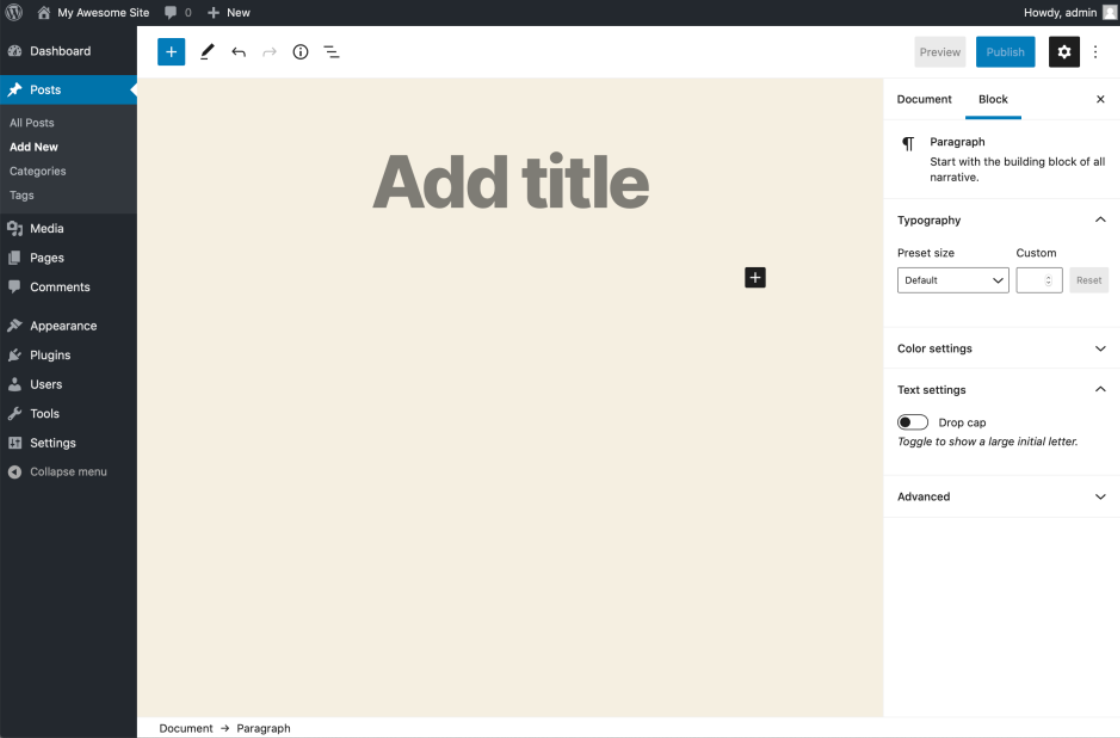
Hocoos, scoring 7.7, is an AI-driven website builder that simplifies the creation of personalized websites through a unique process that requires users to answer eight simple questions. This platform utilizes advanced AI algorithms to automatically generate a custom website tailored to the user’s business needs, including design, content, and images. It features an easy-to-use editor for further customization and offers AI-powered tools for content creation, logo design, and more, making it accessible to users of all technical skill levels.
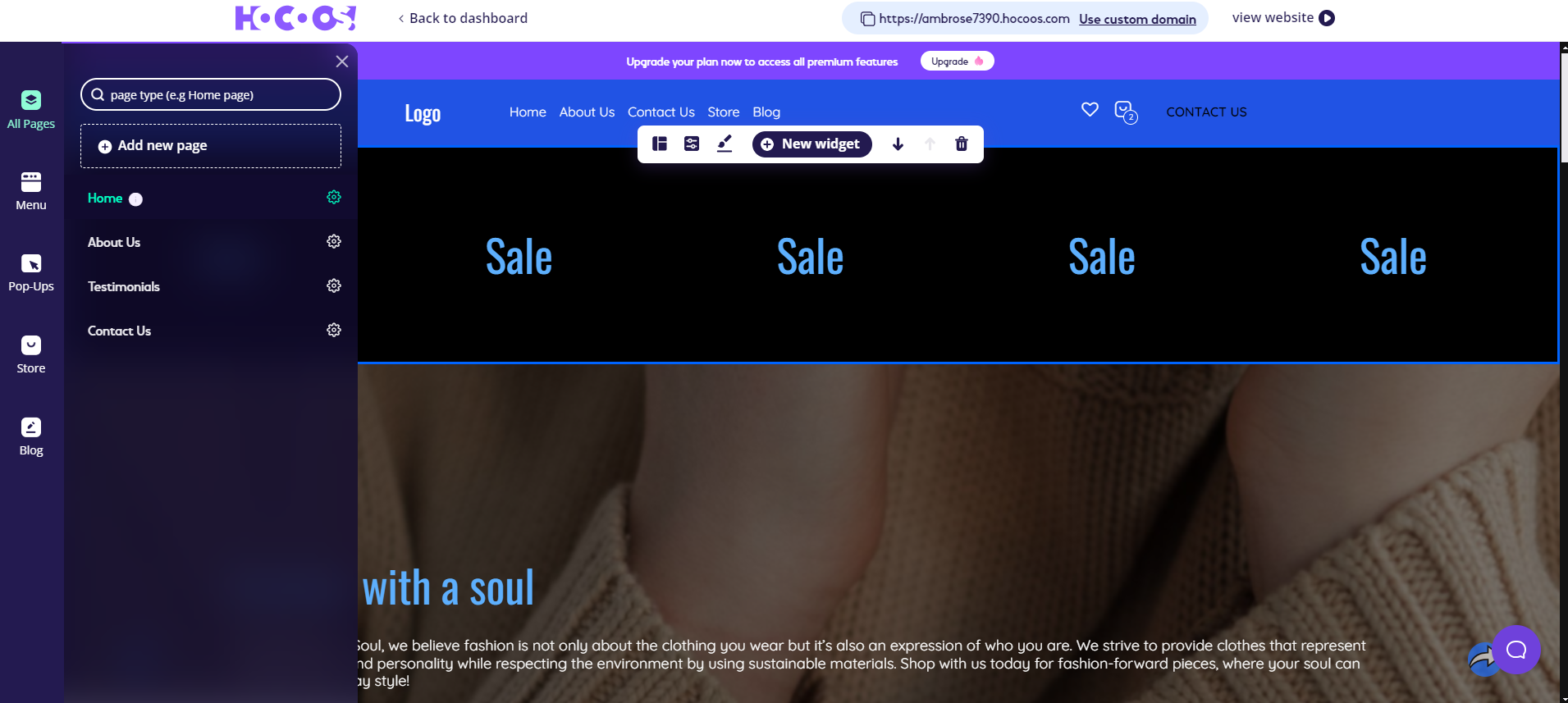
Mobile editor/app
 8.1
8.1
 0
0
🏆
Winner: WordPress
. WordPress offers a mobile editor app that allows users to manage their website on the go. You can create and edit posts, manage comments, schedule content, and analyze website traffic from your phone or tablet. While it offers convenience and basic functionality, it has some limitations compared to the web-based editor, including fewer advanced options, restricted code access, and limited design customization.
Hocoos, on the other hand, does not have a dedicated mobile app, which puts it at a disadvantage in this category. Therefore, WordPress is the clear winner when it comes to mobile editing capabilities.
Product testing options
Product Testing OptionsAssesses the options for trying out platform features before commitment.Score Components:
- Trial quality (40%): Extent and usefulness of the trial or free version.
- Feature accessibility (30%): How many features are available to test.
- Trial duration (20%): Length of the trial period.
- Ease of transition (10%): Smoothness of moving from trial to paid plans.
 8.1
8.1
 7.5
7.5
Overall Result
:
WordPress wins
. WordPress scores 8.1 in product testing options, while Hocoos scores 7.5. WordPress, being an open-source CMS, is free to use and doesn’t offer a trial version or the possibility to test premium features. Hocoos, on the other hand, offers a free version and some premium features can be tested with the free plan. It also provides a 14-day money-back guarantee.

|

|
|
|---|---|---|
|
Free Plan |
Yes (open source software) |
Yes |
|
Trial Duration |
No | No |
|
Testing Premium Features |
No | Some features can be tested with free plan |
|
Money Back Guarantee |
No payments required | 14 day money back guarantee |
Price
PriceLooks at the cost-effectiveness and value for money of each platform.Score Components:
- Plan value (40%): What each pricing tier offers.
- Transparency and clarity (30%): Clearness of pricing structures.
- Flexibility of plans (20%): Range of options to suit different budgets.
- Hidden costs (10%): Additional expenses not included in the plan.
 5.9
5.9
 7.8
7.8
Hocoos offers more straightforward pricing with a free and a premium plan, while the cost of using WordPress depends on the hosting provider and website builder chosen.

|

|
|
|---|---|---|
|
Free |
Free Plan ($0/month): WordPress is open source software that is free. WordPress does not provide hosting services; so, it is necessary to purchase a domain, web hosting, and website builder subscriptions separately. While WordPress lacks built-in ecommerce, plugins like WooCommerce offer a solution. WordPress offers an extensive variety of templates and designs. WordPress lacks a built-in AI-assisted builder, but its open-source nature allows for an ecosystem of plugins and themes incorporating AI for website building. |
Free ($0/month): Limited features, ideal for personal projects or trying out the platform. Includes free website hosting, a limited booking system, a blog (without AI blogging), 15 image uploads, and 20 uses of AI content generation. |
|
$0+ |
No offering at this amount. |
Premium ($15/month): All features, including a free custom domain name, online payments, 600,000+ stock images, marketing integrations, unlimited image uploads, unlimited AI features, a custom email address, and email marketing. Value for Price: 9.0 |
location. As a result in rare cases the prices displayed here can differ from the ones you see on their
websites.
Hosting quality
Hosting
qualityExamines the reliability and performance of the hosting solutions.Score Components:
- Uptime (40%): Consistency and reliability of website availability.
- Speed (30%): Loading times and performance.
- Bandwidth and storage (20%): Sufficiency of resources provided.
- Data centers (10%): Quality and distribution of hosting infrastructure.
 0
0
 2.4
2.4
🏆
Winner: Hocoos
Although both WordPress and Hocoos have low hosting quality scores, Hocoos slightly edges out WordPress as it provides hosting services, albeit with limited details. WordPress, being an open-source CMS, relies on third-party hosting providers, which can vary in quality and reliability.

|

|
|
|---|---|---|
|
Do they offer hosting? |
No |
Yes |
|
Data Centers: |
Depends on hosting provider |
Not specified |
|
Type of hosting: |
Depends on hosting provider |
Not specified |
|
Uptime: |
Depends on hosting provider |
Not specified |
|
Uptime Guarantee: |
Depends on hosting provider |
No |
Website Speed Optimization
Website Speed OptimizationEvaluates optimization of website loading timesScore Components:
- PageSpeed Score (30%): Google’s score indicating performance optimization.
- Loading Time (30%): The average time until a website is fully interactive.
- Mobile Optimization (15%): Optimization effectiveness for mobile devices.
- Resource Optimization (15%): Optimizing images, scripts, and other heavy resources.
- CDN Usage (10%): Use of CDN to enhance speed across geolocations.
 6.5
6.5
 6.2
6.2
🏆 Winner: WordPress
Both WordPress and Hocoos place a high priority on website performance and page speed, with WordPress providing numerous learning resources on how to optimize the website and Hocoos using strategies like CDN, minimization of HTTP requests, and caching for speed optimization. However, WordPress gets a slight edge when it comes to website speed optimization.

|

|
|
|---|---|---|
|
Focus |
Learning resources for optimization |
CDN, Minimization of HTTP Requests, Caching |
|
Performance Tools |
Core Web Vitals, WP Rocket, Hummingbird |
Not specified |
|
Key Strategies |
No specific strategy |
CDN, Minimization of HTTP Requests, Caching |
|
Load Times |
Varies widely, dependent on optimization |
Varies widely, depending on optimization |
|
Page Speed Scores Range |
Scores vary; influenced by apps, images |
Varies widely, depending on optimization |
|
Core Web Vitals Improvement |
Provides valuable resources |
No information available |
WordPress, being an open-source content management system, does not have a specific strategy for website speed optimization. However, it provides numerous learning resources on how to optimize the website. It also provides valuable resources for enhancing the website’s Core Web Vitals (CWV), such as analyzing CWV, choosing a reliable host, optimizing images, minimizing plugins, using lazy loading, and employing a CDN. Tools like Core Web Vitals, WP Rocket, Hummingbird are recommended, and AMP is considered for mobile speed.
On the other hand, Hocoos, an AI website builder and hosting platform, uses strategies like CDN, minimization of HTTP requests, and caching for speed optimization. The load times and PageSpeed score ranges for Hocoos vary widely, depending on the optimization and user’s location. However, there is no information available about CWV improvements of Hocoos.
Get a head start on website creation with AI
Create a custom website tailored to your business needs 10X faster with 10Web AI Website Builder!
Plugins and integrations
Plugins and integrationsMeasures the range and effectiveness of additional plugins and integrations.Score Components:
- Variety of options (40%): Range of available add-ons.
- Integration smoothness (30%): Ease of integrating plugins into the site.
- Quality of plugins (20%): Functionality and reliability of the options.
- Custom integration capabilities (10%): Support for custom or third-party integrations.
 8.8
8.8
 6.3
6.3
🏆 Winner: WordPress.
With a score of 8.8, WordPress offers over 60,000 free plugins and thousands of premium ones from third-party companies and developers. This extensive range of plugins and integrations extends its functionality across various domains, including advanced ecommerce tools, SEO optimization, social media integration, email marketing, website analytics, appointment scheduling, customer support, enhanced media galleries, blogging features, custom forms and surveys, diverse payment processing options, website localization, improved security measures, and the addition of custom widgets.
On the other hand, Hocoos, with a score of 6.3, also offers a wide range of plugins and extensions to enhance the functionality of your website. However, it falls short in comparison to the vast library of options provided by WordPress.
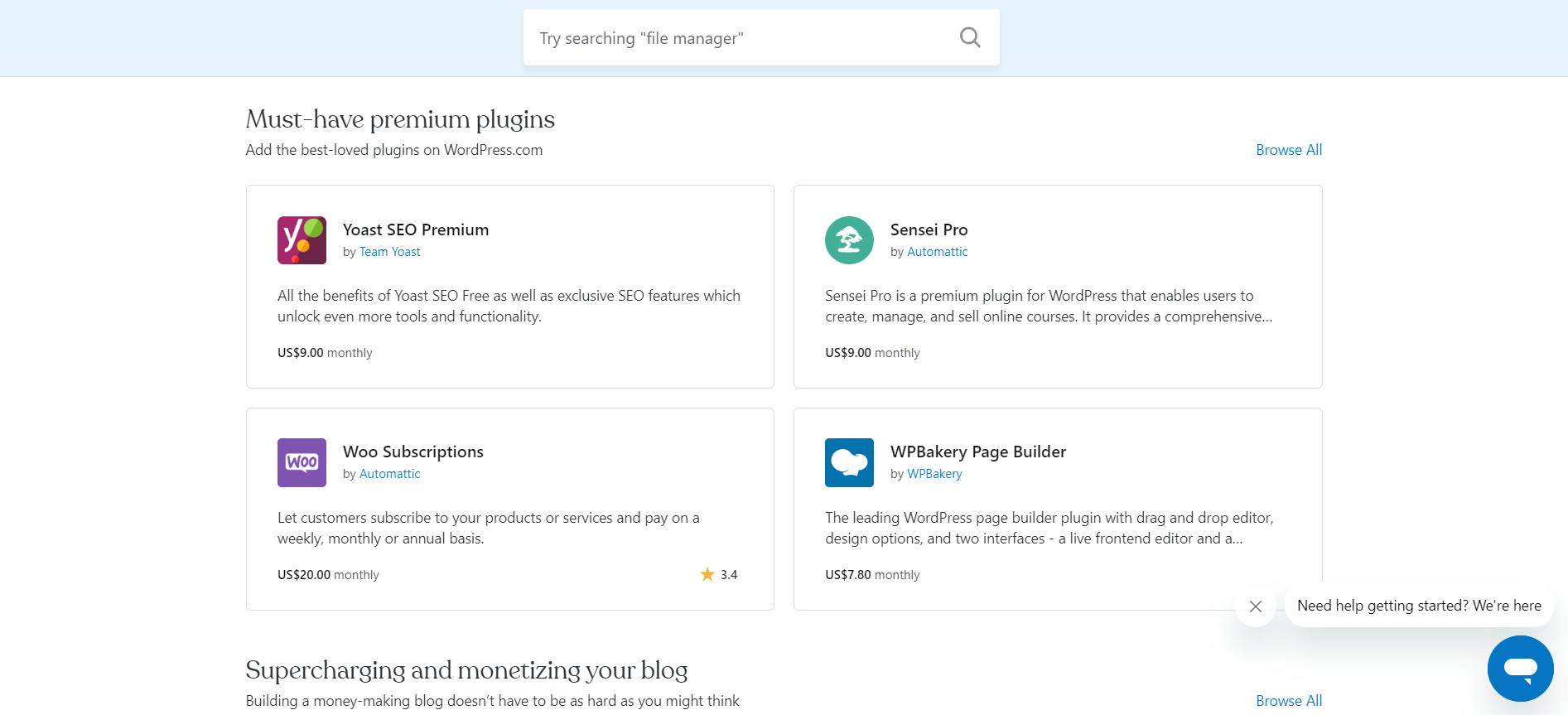
Marketing Features
Design FunctionalitiesRepresents how well each platform allows for creative design and customization of websites.Score Components:
- Template Variety (30%): Range and quality of design templates.
- Customization (30%): Flexibility and options for design alterations.
- User Interface (20%): Ease and intuitiveness of the design process.
- Responsiveness (10%): Adaptability to different devices and screen sizes.
- Innovation (10%): Unique design features and tools.
 8.0
8.0
 7.0
7.0
🏆
Overall Winner: WordPress
. WordPress stands out for its extensive customization options through plugins, making it suitable for a wide range of marketing needs. Hocoos, on the other hand, offers a more streamlined, user-friendly approach with a focus on AI and automation.

|

|
|
|---|---|---|
|
SEO Tools |
|
|
|
Email Marketing |
Via plugins |
On premium plan |
|
Blogging |
|
|
|
Social Media Integration |
Via plugins |
|
|
Analytics and Reporting |
Via plugins like Google Analytics for WordPress |
Integration of Google Analytics |
|
Ads and Promotions |
Support for Google Ads and ad management through various plugins |
Integration with Google Ads, Microsoft ads, etc. |
Customer Support
Customer supportEvaluates the quality and availability of support options.Score Components:
- Response time (40%): Speed of support responses.
- Support quality (30%): Effectiveness and helpfulness of the support.
- Availability (20%): Range of support channels (phone, chat, email).
- Resource richness (10%): Quality of self-help and educational materials.
 5.0
5.0
 3.0
3.0
🏆 Winner: WordPress
. Comparing WordPress vs Hocoos, WordPress takes the lead in this category with a customer support score of 5.0. Although WordPress lacks direct customer support due to its open-source nature, users can find assistance through community forums, the WordPress codex, hosting provider support, and plugin and theme support. This extensive community-driven support network ensures that users can find solutions to their issues, albeit with some effort.
Hocoos, on the other hand, has a customer support score of 3.0. While Hocoos emphasizes that their customer support is 100% human, detailed information about their support type, hours, and availability is not readily available. This lack of transparency and lower user satisfaction score indicate that Hocoos may not be as reliable in providing timely and effective support compared to WordPress.
Security
SecurityLooks at the platforms’ security measures and data protection.Score Components:
- Data protection (40%): Safeguards for user and customer data.
- SSL and encryption (30%): Implementation of secure connections.
- Compliance (20%): Adherence to industry security standards.
- Regular updates (10%): Frequency of security updates and patches.
 6.7
6.7
 4.5
4.5
🏆
Winner: WordPress
. WordPress, being an open-source platform, offers a variety of plugins to enhance security. These include site backups, monitoring, malware scanning, user activity tracking, permission control, and spam protection tools. However, the level of protection can vary depending on the hosting provider.
Although it may not offer the same level of specialized ecommerce security features as WordPress, Hocoos is committed to maintaining a secure platform for all types of websites. This includes advanced encryption protocols and regular updates. However, Hocoos does not provide specific information about its security measures. Considering the fact that Hocoos relies heavily on AI, it is likely that they use advanced encryptions for their platform. Despite this, the lack of transparency regarding their security measures puts them at a disadvantage compared to WordPress.
AI Capabilities
AI capabilitiesMeasures the effectiveness of AI-driven features and tools.Score Components:
- Automation efficiency (40%): Impact of AI on streamlining processes.
- Personalization (30%): AI-driven customization for users or customers.
- AI-Assisted design (20%): Role of AI in website design and functionality.
- Data analysis (10%): Use of AI in interpreting user data and analytics.
 6.1
6.1
 7.3
7.3

|

|
|
|---|---|---|
|
AI Builder |
AI plugins like AI Site Builder and Zita |
Built-in AI website builder |
|
AI Ecommerce features |
AI plugins for marketing, personalization, content management |
Personalized product recommendations, visual search, AI chatbots |
|
AI Content Generation |
AI plugins like AI Engine, GetGenie |
Built-in AI Content Creator |
|
Additional AI features |
Wide range of AI plugins |
Dynamic content widgets, mobile optimization, domain protection |
🏆 Winner: Hocoos
. Hocoos, with a score of 7.3, offers a comprehensive suite of AI capabilities, including a built-in AI website builder, AI-powered ecommerce features, content generation, and additional features. Its AI tools are designed to save users time and effort, making website creation more efficient and user-friendly.
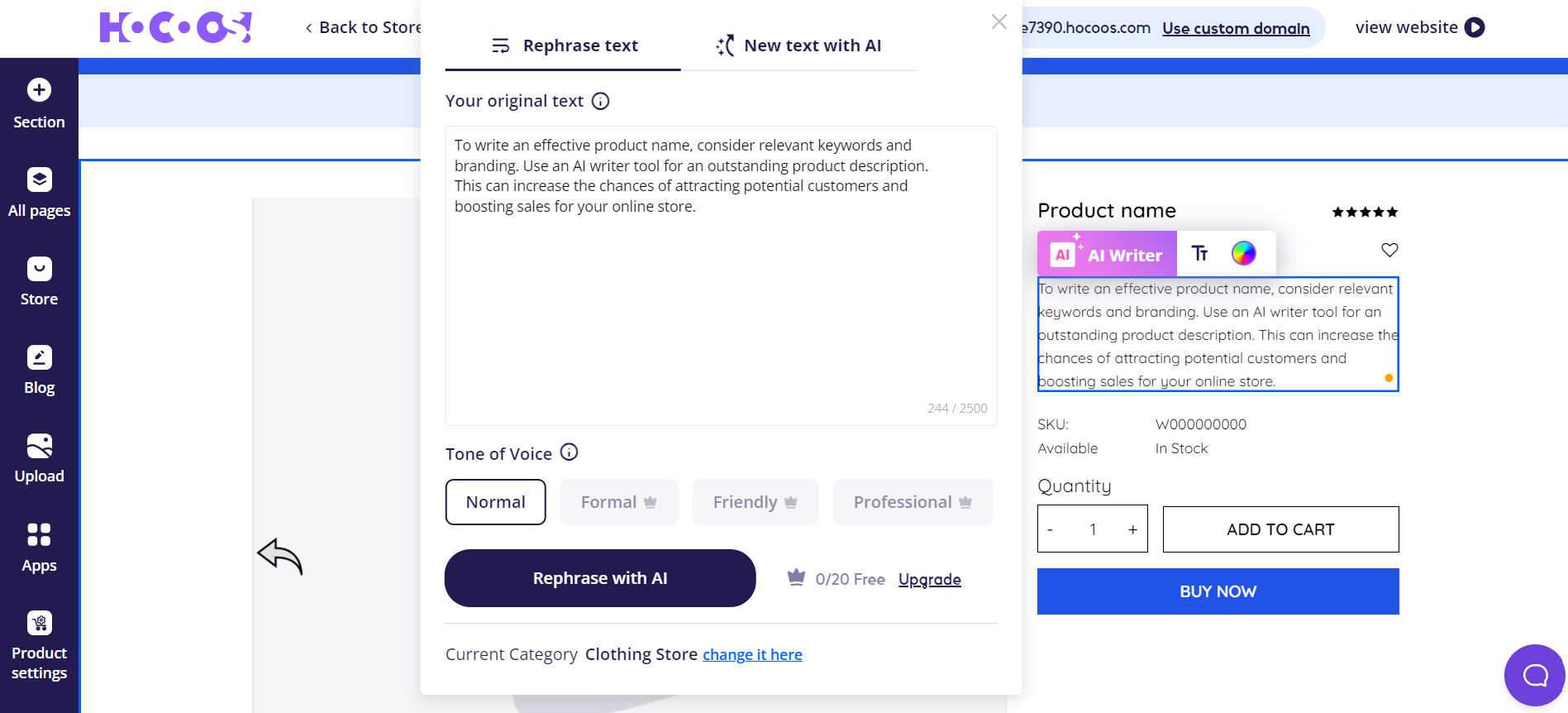
WordPress, with a score of 6.1, does not have built-in AI capabilities but allows for integration of AI plugins. This open-source nature provides flexibility and customization options, but it also requires users to find and install the right plugins to leverage AI capabilities.
User Management
User ManagementAssesses the platforms’ capabilities in managing user roles, permissions, and accessibility.Score Components:
- Role Customization (40%): Flexibility in creating and defining user roles and
permissions. - Ease of Management (30%): User interface and tools for managing users.
- Access Control (20%): Effectiveness of access control measures for different user
levels. - Scalability (10%): Ability to manage a growing number of users efficiently.
 8.8
8.8
 0.0
0.0
🏆 Winner: WordPress
. WordPress offers a robust user management system with different roles and permissions, while Hocoos does not support multiple users for editing a website.
- WordPress: The editing access for a WordPress.org website depends on user roles and additional controls. User roles, ranging from Super Admin to Subscriber, dictate the level of permissions, while plugins and controls such as role management plugins and revision control offer further customization for specific editing rights and collaboration.
- Hocoos: Hocoos does not allow to have multiple users for editing your website.
WordPress User Roles and Access Levels:
| Role | Description | Access Highlights |
|---|---|---|
| Super Admin | Manages the entire network in WordPress Multisite. | Network admin, manage sites, users, plugins, themes. |
| Administrator | Full access within a single site. | Manage plugins, themes, users, all posts/pages. |
| Editor | Manages and publishes content, including others’ posts. | Edit/publish all posts, manage comments, categories. |
| Author | Publishes and manages their own posts. | Write, edit, publish own posts, upload files. |
| Contributor | Writes and edits their own posts but cannot publish. | Write, edit own posts (no file uploads or publishing). |
Additional Features

|

|
|
|---|---|---|
|
SSL Certificate |
|
|
|
Custom Domain |
|
|
|
Free Custom Domain Included |
|
|
|
International Domains |
|
|
|
Mobile Responsive |
|
|
|
Page Speed |
|
|
|
Website Builder Mobile App |
|
|
|
Convert a Website To An App |
|
|
|
Website Analytics |
|
|
|
Multilingual Sites |
|
|
|
Multiple Users |
|
|
WordPress vs Hocoos: User Feedback
WordPress receives praise for its user-friendliness, cost-effectiveness, extensive themes and plugins, customization options, and supportive community. However, users mention technical challenges, security concerns, a learning curve, and a lack of direct support. Overall, it remains a widely used and versatile platform, especially beneficial for startups and small businesses.
Hocoos, on the other hand, does not have any reviews on G2. This lack of user feedback makes it challenging to gauge user satisfaction and experiences. When comparing WordPress vs Hocoos, the extensive feedback and established reputation of WordPress provide a clearer picture of its strengths and areas for improvement.
The making of this blog
We followed a clear, step-by-step process to write and research this article.
WordPress vs Hocoos: FAQ
Which platform is better for ecommerce, WordPress or Hocoos?
Can I build an informational or business website easily with either platform?
How do WordPress and Hocoos compare in terms of ease of use?
Which platform offers better website speed optimization?
Are there any differences in the customer support provided by WordPress and Hocoos?
Which platform has better AI capabilities?
Is WordPress or Hocoos more suitable for users with no coding experience?
How do the platforms compare in terms of plugins and integrations?
Which platform is more cost-effective for building a website?
Can I manage multiple users on either platform?










